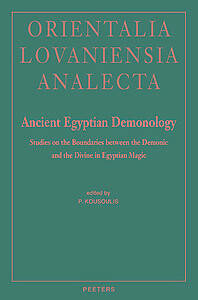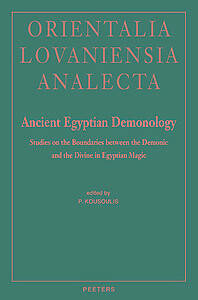
Je cadeautjes zeker op tijd in huis hebben voor de feestdagen? Kom langs in onze winkels en vind het perfecte geschenk!
- Afhalen na 1 uur in een winkel met voorraad
- Gratis thuislevering in België vanaf € 30
- Ruim aanbod met 7 miljoen producten
Je cadeautjes zeker op tijd in huis hebben voor de feestdagen? Kom langs in onze winkels en vind het perfecte geschenk!
- Afhalen na 1 uur in een winkel met voorraad
- Gratis thuislevering in België vanaf € 30
- Ruim aanbod met 7 miljoen producten
Zoeken
Ancient Egyptian Demonology
Studies on the Boundaries Between the Demonic and the Divine in Egyptian Magic
P. Kousoulis
€ 149,95
+ 299 punten
Omschrijving
In the Egyptian context, what we term magic and demon, drawing on our own cultural heritage, are not seen as negative aspects of cultural practice and conceptualisation. Similarly, the Egyptian equivalents do not carry the pejorative connotations borne by the modern terms and their Greek antecedents; magic and demons can be forces for good as well as evil. Indeed, the practice of magic and the conceptualisation of personified demonic agents are central to the Egyptian understanding of the workings of the world from the very continuation of the cosmos itself down to the vicissitudes of existence faced by individuals. In particular, the broader practice of magic and articulation of the involvement of demonic agency form one of the crucial links in Ancient Egypt between individual existence on the human level and the level of nature or the cosmos, the realm of the gods. Unlike, though, the explicit recognition of the term demon in the ancient Greek language and religion, as the intermediary between god and mortals, the majority of the demonic names in the Egyptian literature do not possess an apparent ontological essence, or a clearly defined denotation. Their characteristics and role depended momentously on the verbal and performative ritual environment they were part of. The relation between the name of a demon and its cosmic-natural personification is not contradictory as it may seem, but it is closely interwoven in a well established ritual framework of words and actions. This multi-authored volume of 10 essays comprises an up-to-date authorized account of many aspects of ancient Egyptian demonology, including the multiple persona of the demonic or name vs. identity in the Egyptian formation of the demonic, nightmares and underworld demons, dream rituals and magic, categories of demonic entities and the vague distinction between the divine and the demonic in Egyptian cosmology and ritual, the theological and demonic aspects of Egyptian magic, and demons as reflections of human society. Contributors include Paul John Frandsen, Hedvig Gyory, Joachim Friedrich Quack, Yvan Koenig, Panagiotis Kousoulis, Alan Lloyd, Robert Ritner, Alessandro Roccati, Kasia Szpakowska and Penelope Wilson.
Specificaties
Betrokkenen
- Auteur(s):
- Uitgeverij:
Inhoud
- Aantal bladzijden:
- 198
- Taal:
- Engels
- Reeks:
- Reeksnummer:
- nr. 175
Eigenschappen
- Productcode (EAN):
- 9789042920408
- Verschijningsdatum:
- 29/09/2011
- Uitvoering:
- Hardcover
- Formaat:
- Genaaid
- Afmetingen:
- 165 mm x 244 mm
- Gewicht:
- 589 g

Alleen bij Standaard Boekhandel
+ 299 punten op je klantenkaart van Standaard Boekhandel
Beoordelingen
We publiceren alleen reviews die voldoen aan de voorwaarden voor reviews. Bekijk onze voorwaarden voor reviews.









